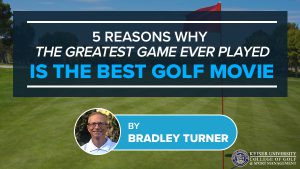Five Reasons Why The Greatest Game Ever Played is the Best Golf Movie

By Bradley Turner Keiser University College of Golf Director of Online Golf Instruction – MBA, PGA
The Greatest Game Ever Played is the story of a reluctant hero who eventually conquers the demons of golf and comes home the victor. The movie mirrors many classic films and books with the hero or heroine saving humanity from the evil empire. Many great stories follow the hero’s journey, which Joseph Campbell first wrote in his book The Hero with a Thousand Faces. Campbell discovered a pattern or template that appeared in many celebrated novels and stories. The hero’s journey’s essence is that he would “follow his bliss” and leave the ordinary world on an adventure that tests the hero’s skills, resilience, and courage. Along the way, mentors and allies help the hero overcome obstacles to his destiny as he returns home to the ordinary world with the spoils of victory.
Francis Ouimet was born on the “wrong side of town” into a working-class family. He started caddying at the Country Club of Brookline in Boston at a very early age to bring home money for the family. As he became immersed in the game of golf, he encountered a few individuals who helped him on his journey, as well as resistance from his father, the elitist discrimination of the wealthy class, and the challenges of the game of golf itself. When you watch the movie, The Greatest Game Ever Played, you watch the journey of Francis Ouimet, America’s first golfing hero.
#1 Call to Adventure
Ouimet’s journey from his ordinary world begins when he applies to play in the U.S. Amateur Championship in 1910, which is held at the Country Club of Brookline. He confronts the discriminatory tournament executive committee, which does not believe a caddy should be playing in a national championship. Ouimet’s father is also opposed to his participation in the tournament, but Ouimet is eventually allowed to pay the entry fee and participate in the qualifying tournament. Ouimet and his father make a bargain that if Ouimet does not qualify for the National Amateur, then Ouimet will give up the game and focus on school and learning a trade.
In the qualifying tournament, he is on the verge of qualifying as his nerves are tested under the pressure of championship golf. Ouimet fails the test and does not qualify for the National Amateur. His call to adventure is temporarily diverted as he is forced to quit the game to honor the bet with his father.
#2 Refusal of the Call
In 1913, the U.S. Open returned to the Country Club of Brookline. The president of the USGA, Robert Watson, offers Ouimet the chance to play as a local amateur. Initially, Francis refuses the call to play partly because of his respect for his father and his fear of the mental challenges of championship golf.
After he refuses the invitation to the tournament, he attends an opera with his mother and observes the performance of the singers and the appreciation from the audience. Ouimet realizes that the feeling the opera singers experience is exactly what he has been seeking on his golf journey. He decided to follow his bliss and entered the 1913 U.S. Open.
#3 Mentors, Obstacles, and Allies
In every hero’s journey, some individuals attempt to persuade and influence the direction of the hero’s path. Mentors provide the hero with the tools and powers to be successful on the journey. Harry Vardon was a mentor and idol to Ouimet. As a young boy in 1900, Francis skips school to see the world-famous golfer in an exhibition where Vardon shows the young Ouimet the “Vardon grip.” This encounter with Vardon inspired him to learn the game of golf in hopes of one day playing against Vardon. Later that year, Vardon went on to win the 1900 U.S. Open, proving that he was the best golfer in the world. Another mentor was Alex Campbell, the Scottish golf professional who first acknowledged Ouimet’s keen interest in the game. He provided young Francis with his first golf club. He also gave him Harry Vardon’s golf book and instructed him to memorize the book, which Francis did. Campbell supported and coached Ouimet on his journey to the U.S. Open championship.
Ouimet faced three primary obstacles on his way to the 1913 U.S. Open. In that era, caddies were not expected to play in such elite events; they did not belong because of their working-class heritage. The second was his father, who adamantly opposed Ouimet’s pursuit of “following your bliss.” Lastly, he had to overcome the mental challenges of the game of golf in championship play. Harry Vardon wrote in his book, “there are only two types of players, those that can keep control of their nerves and win championships and those that do not.” Ouimet did not know which type of golfer he would become.
Heroes need allies, and Ouimet’s mother was always on his side. Secretly encouraging Francis despite the father’s concerns, she could see her son’s passion for the game and ensured that he followed his dream. Mr. Hastings, a club member who used Ouimet as his primary caddie, was another ally as he looked past his working-class heritage and pushed Ouimet to play in the big tournaments. The last important ally was Eddie Lowery, the 10-year-old caddie during the Supreme Ordeal, the 1913 U.S. Open.
#4 The Supreme Ordeal and the Final Test
The 1913 U.S. Open was held at the Country Club of Brookline, where Ouimet had caddied for many years. Ted Ray and Harry Vardon, both from England, were the two most prominent players in the world at the time. Ray and Vardon had been commissioned to sail across the Atlantic and participate in some exhibition matches across America. Vardon was the best player in the world, having won five Open Championships before the 1913 U.S. Open. In his only previous U.S. Open in 1900, Vardon won. Ted Ray was no slouch himself, having won the 1912 Open Championship and finished runner-up in the 1913 Open. Players from Great Britain dominated golf as they had won every U.S. Open from 1895 to 1910. Johnny McDermott was a professional golfer and the first American-born U.S. Open champion, winning in 1911 and 1912. The American professionals were a huge underdog to the British contingent, while an American amateur was not even a consideration for keeping the trophy on home soil.
At the 1913 U.S. Open, no one knew who Francis Ouimet was aside from the Country Club of Brookline members and a few prominent golfers in Massachusetts. As an amateur, he was no match for the two best golfers in the field. But he had an ally on his side in the form of Eddie Lowery, the 10-year-old caddie who provided just enough motivation and toughness to keep Ouimet performing at his best. Ouimet overcomes the nerves of championship competition and famously birdies the 71st hole of the championship and pars the last to tie both Harry Vardon and Ted Ray. Our hero had overcome the internal demons of the game and proven himself in the supreme ordeal, the U.S. Open. But he still had one final test – an 18-hole playoff against his mentor and the best player in the world, Harry Vardon, and Ted Ray, likely the second-best in the world.
The final test was an 18-hole playoff with one David and two Goliaths. It seemed inconceivable that a young amateur could defeat two seasoned professionals. An estimated 10,000 spectators watched Ouimet outplay the two great champions in the greatest game ever.
#5 Return with the Elixir
After the final test, the journey ends with the hero returning to the ordinary world, holding the elixir or, in Ouimet’s case, the U.S. Open trophy, and the admiration of America. His victory in the U.S. Open was a catalyst for the growth of the game. Those born on “the wrong side of town” began to realize that if a caddy could win the U.S. Open, then certainly they could learn to play the game as well. In 1913, there were an estimated 350,000 golfers in America, and a decade later, there were 2,000,000 golfers. Ouimet was more than a hero to the working class; he was America’s first golf hero.
And yes…it is a true story.












